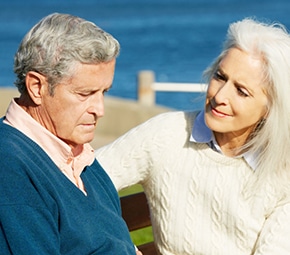Those who suffer from dementia are commonly afflicted by anxiety and panic attacks. This can be especially prevalent in the early stages as they come to grips with their cognitive decline. As a caregiver, friend, or family member, this can be tough to witness, but there are some things that you can do to help them get through anxious periods. Below are six activities you can do with your loved one suffering from dementia to reassure them of their safety, stimulate memory recall, and encourage relaxation. These activities are useful for seniors both living at home and in assisted living settings.
- Breathing Exercises – It may seem cliché, but controlled deep breathing is one of the most widely endorsed exercises for calming seniors with dementia. Deep breathing is done by expanding the diaphragm to fully fill the lungs and actually prompts a relaxation response in the brain. Shallowed, panicked breathing can actually release stress hormones into the body. If your loved one begins to panic, take them to a quiet environment and encourage slow, deep inhalation through the nose, hold the air in for a second or two, then slowly release it through the nose or mouth. After repeating the process for a few minutes, the senior should be in a much more relaxed state.
- Outdoors – Try taking slow, casual walks outdoors when your loved one feels a bit anxious. The outdoor environment and change of scenery can act as a relaxing diversion and will help take his or her mind off of the anxiety source. Other outdoor activities, such as gardening, are also great outlets to consider.
- Brain Exercises – Cognitive exercises are great ways to keep the brain active and not thinking about anxiety triggers. Activities such as playing games, having engaging discussions, or even playing on the computer can help.
- Tai Chi or Yoga – As long as these activities are within the physical capabilities of your loved one, yoga and tai chi can help coordinate the mind and body, and can help promote relaxation. These activities also offer other benefits, including balance coordination and offer an outlet for socializing when practiced in a class. Check with your loved one’s doctor before they begin these activities.
- Music – Listening to the senior’s favorite music or just generally calming music is a great way to help ease their sense of panic.
Do you have a senior loved one who suffers from dementia? At Angels Senior Living, our memory care facilities are designed to provide a happy and healthy life for those with Alzheimer’s and dementia. For more information on our memory care facilities, contact Angels Senior Living at (877) 480-2244 today.






